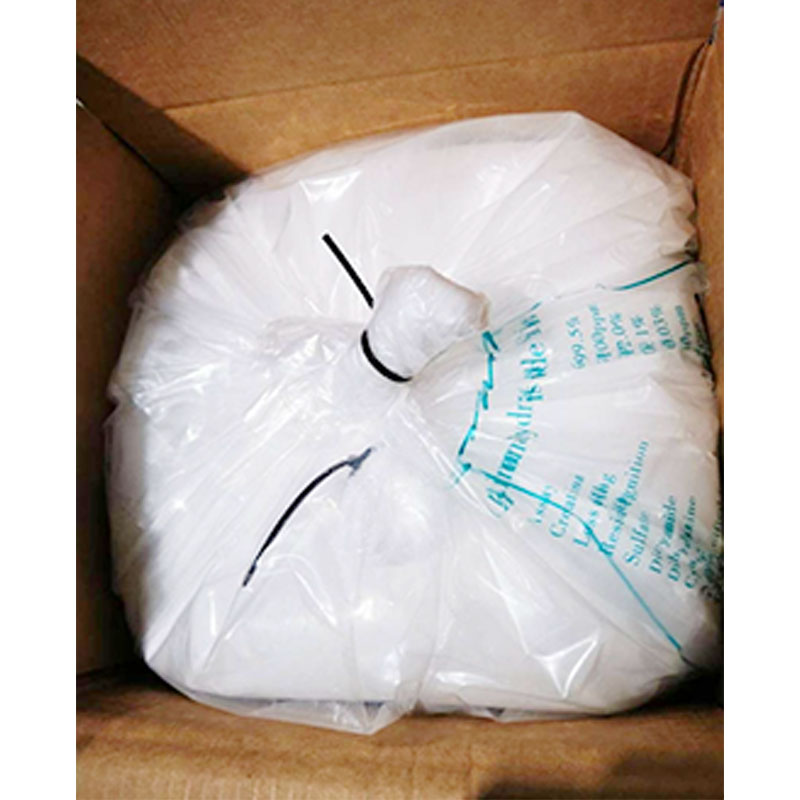How does creatine monohydrate help prevent muscle fatigue and delayed muscle soreness?
Release Time : 2025-02-11
As a natural substance widely present in human muscles, creatine monohydrate has attracted much attention in the field of fitness and sports in recent years. It can not only help muscles produce more energy in a short period of time, but also effectively prevent muscle fatigue and delayed muscle soreness, becoming the preferred nutritional supplement for many athletes and fitness enthusiasts.
In high-intensity exercise, the energy required for muscle contraction mainly comes from the decomposition of adenosine triphosphate (ATP). However, the reserves of ATP are limited and need to be regenerated quickly to maintain exercise. After creatine monohydrate enters the human body, it will combine with phosphate to generate creatine phosphate under the action of creatine kinase. When ATP is consumed and decomposed into adenosine diphosphate (ADP), creatine phosphate can quickly transfer the phosphate group to ADP, so that it can resynthesize ATP and continuously provide energy for muscles. This process significantly delays muscle fatigue caused by insufficient energy, allowing athletes to maintain longer-lasting strength and endurance during high-intensity training.
In addition to quickly synthesizing ATP, creatine monohydrate can also prevent muscle fatigue by reducing lactic acid accumulation. During anaerobic exercise, muscle cells mainly generate energy through glycolysis, a process that generates lactic acid. As exercise continues, lactic acid gradually accumulates in the muscles, causing a decrease in muscle pH, affecting muscle contraction function, and thus causing muscle fatigue. Creatine monohydrate helps maintain the acid-base balance in muscle cells by improving the buffering capacity in the cells, slowing down the rate of pH decline, reducing the impact of lactic acid accumulation on muscle function, and delaying the occurrence of muscle fatigue.
In addition, creatine monohydrate can also promote the transport and excretion of metabolites in muscle cells, reduce the concentration of metabolites in cells, reduce the negative impact of metabolites on muscle cells, and further delay the onset of fatigue. At the same time, it can also enhance the hydration of muscle cells, keep sufficient water in the cells, maintain the normal morphology and function of the cells, and ensure the smooth progress of various metabolic reactions and signal transduction processes in the cells, thereby enhancing the overall functional state of muscle cells and delaying muscle fatigue.
In summary, creatine monohydrate effectively prevents muscle fatigue and delayed muscle soreness through multiple mechanisms such as rapid synthesis of ATP, reduction of lactic acid accumulation, optimization of metabolite transport, and enhancement of cell hydration, providing strong support for athletes and fitness enthusiasts. Proper use of creatine monohydrate will help you achieve better results in training and competition and achieve your fitness goals.
In high-intensity exercise, the energy required for muscle contraction mainly comes from the decomposition of adenosine triphosphate (ATP). However, the reserves of ATP are limited and need to be regenerated quickly to maintain exercise. After creatine monohydrate enters the human body, it will combine with phosphate to generate creatine phosphate under the action of creatine kinase. When ATP is consumed and decomposed into adenosine diphosphate (ADP), creatine phosphate can quickly transfer the phosphate group to ADP, so that it can resynthesize ATP and continuously provide energy for muscles. This process significantly delays muscle fatigue caused by insufficient energy, allowing athletes to maintain longer-lasting strength and endurance during high-intensity training.
In addition to quickly synthesizing ATP, creatine monohydrate can also prevent muscle fatigue by reducing lactic acid accumulation. During anaerobic exercise, muscle cells mainly generate energy through glycolysis, a process that generates lactic acid. As exercise continues, lactic acid gradually accumulates in the muscles, causing a decrease in muscle pH, affecting muscle contraction function, and thus causing muscle fatigue. Creatine monohydrate helps maintain the acid-base balance in muscle cells by improving the buffering capacity in the cells, slowing down the rate of pH decline, reducing the impact of lactic acid accumulation on muscle function, and delaying the occurrence of muscle fatigue.
In addition, creatine monohydrate can also promote the transport and excretion of metabolites in muscle cells, reduce the concentration of metabolites in cells, reduce the negative impact of metabolites on muscle cells, and further delay the onset of fatigue. At the same time, it can also enhance the hydration of muscle cells, keep sufficient water in the cells, maintain the normal morphology and function of the cells, and ensure the smooth progress of various metabolic reactions and signal transduction processes in the cells, thereby enhancing the overall functional state of muscle cells and delaying muscle fatigue.
In summary, creatine monohydrate effectively prevents muscle fatigue and delayed muscle soreness through multiple mechanisms such as rapid synthesis of ATP, reduction of lactic acid accumulation, optimization of metabolite transport, and enhancement of cell hydration, providing strong support for athletes and fitness enthusiasts. Proper use of creatine monohydrate will help you achieve better results in training and competition and achieve your fitness goals.





